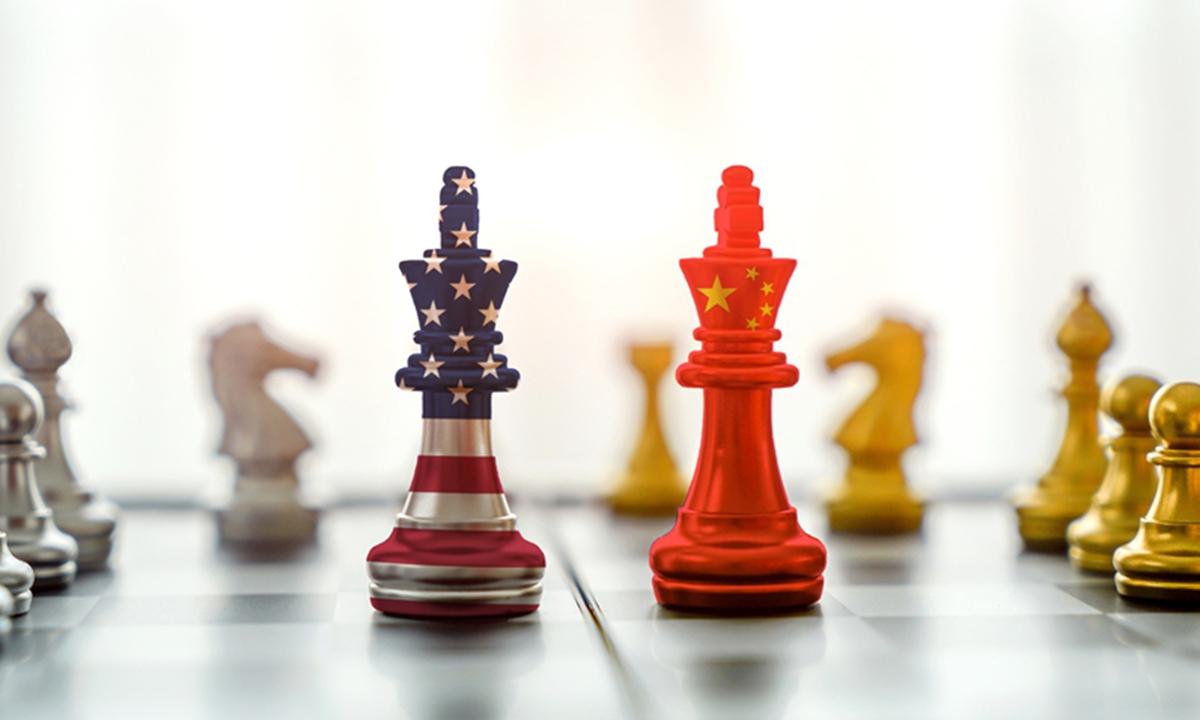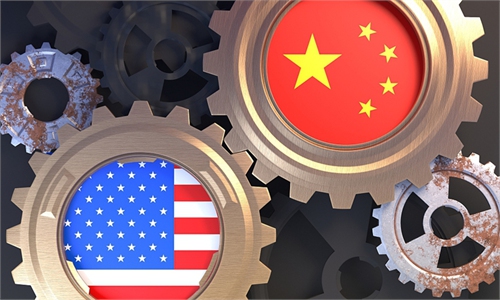Biden expands crackdown on Chinese high-tech firms, but lawsuits prepare to challenge Washington: expert

China-US Photo: GT
In its latest move, which was not unexpected under the Joe Biden administration's "competition" goal with China, the US government has ramped up its crackdown on China's rising high tech sector by putting more firms on an investment blacklist. While the Biden administration is set to take even more measures to contain China in an escalating rivalry, it won't disrupt China's future advancement into becoming a technology power, experts said.
Biden signed an executive order on Thursday amending a ban on US investment in Chinese companies, blocking 59 Chinese companies with supposed ties to China's military or surveillance industry, including Huawei, China General Nuclear Power Corp and the country's three major telecommunications companies.
Under the new order, which initially started under the former Trump administration, US investors will be banned from buying or selling publicly-traded securities from those companies. The ban will take effect August 2, and investors will have one year to divest.
The Global Times found that in the new blacklist, the Biden administration kept 26 out of the 44 companies that were originally sanctioned during the Trump era, but added 33 new companies and entities, bringing the total number to 59.
The move shows that Biden will not only maintain but also expand policies made to restrict Chinese firms' growth made during his predecessor's tenure, while one of his current aims is to seek a more comprehensive and in-depth strategy to "compete" with China, especially in the high tech sector, as most of the sanctioned firms represent China's technological and comprehensive strength, experts told the Global Times.
Some of the newly-added firms on the blacklist include subsidiaries or affiliates of large companies listed on the previous list. For example, some companies related to the Aviation Industry Corp of China and two finance-related companies of Huawei were added.
Cai Kaiming, a senior partner at Beijing-based law firm Dentons, told the Global Times on Friday that it was discussed whether the related or subordinate ones should be added to the list during Trump's presidency, but now Biden has made it official.
"It is the most sweeping executive order targeting Chinese tech entities since Biden took office, although there have been some sanctions previously," Li Haidong, a professor at the Institute of International Relations of China Foreign Affairs University, told the Global Times on Friday.
The move, a political operation at the cost of economic interests, has strong "symbolic" meaning, Li said. "It's like showing the US stance toward its allies."
However, the broader ban will surely "lift a rock only to drop it on its own feet in the end" for the US government, because it will cause bigger losses for US firms and investors that have close cooperation with entities on the list, Li noted, adding that US' intention to wallop Chinese economy and firms via such tactics would turn out to be daydreaming and won't disrupt China's technological advancement on global stage.
Meanwhile, the Biden administration removed some Chinese firms from the original list according to standards that were not made quite clear during his predecessor's period, said Cai.
Besides Xiaomi, the Chinese smartphone vendor that won a lawsuit in US court against the Pentagon in May, two other Chinese firms - Luokung Technology Corp and Gowin Semiconductor Corp - were also absent from the amended list, to which Cai said "it is probably related to their lawsuit challenging the US government."
Luokung, the Chinese mapping and cloud software technology provider, sued the US government in early March. The NASDAQ-listed company received a temporary ruling from a US court on May 5, suspending the ban. Gowin Semiconductor also initiated a lawsuit, according to Cai.
"Given Xiaomi's victory, the US government intentionally removed the other two from the list," he said, suggesting that Chinese firms should learn to seek law protection because there is room to challenge the US.
More Chinese firms will be added to the investment ban, US media reported, citing an anonymous US official, and the list of firms will be updated on a rolling basis.
From the perspective of Chinese businesses, the impacts will be limited. He Weiwen, a former economic and commercial counselor at the Chinese consulate general in San Francisco and New York, told the Global Times that the main limitation of the investment ban is that US investors cannot directly invest in those Chinese firms. Meanwhile, the Chinese firms listed cannot publicly raise funds in the US market.
"Seen from public data, however, US direct investment in China only accounts for 2 percent of China's foreign investment; that is, about $2.6 billion, so the impact is little," He said, adding that the ban's impact on indirect investment needs further observation.
A representative of Fujian Torch Electron Technology Co, a Chinese manufacturer and seller of high-tech electronic components that has been put onto the list in the latest round, told the Global Times on Friday that it does not care the US blacklisting policy toward China and minds its own development attentively.
Biden's move comes soon after China and the US restarted more regular communications addressing economic recovery and trade, agreeing on joint efforts to solve several specific problems in a practical way.
Chinese Vice Premier Liu He held a virtual meeting with US Treasury Secretary Janet Yellen on Wednesday, which followed a phone call between Liu and US Trade Representative Katherine Tai just six days earlier, on May 27.
In response to Biden's pressing move, Wang Wenbin, a Chinese Foreign Ministry spokesperson, said Friday that China will take necessary measures to safeguard the legitimate rights and interests of Chinese companies and firmly supports them in protecting their own rights in accordance with the law, and urged the US to respect market law and principle and withdraw the investment ban list.


